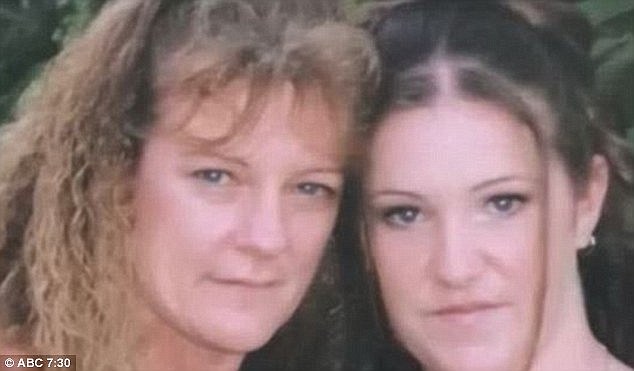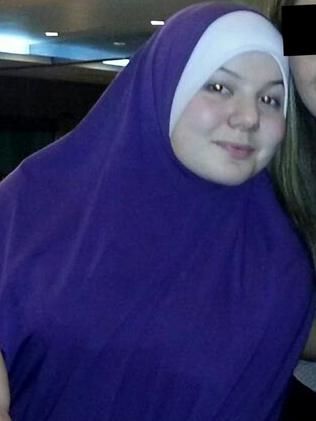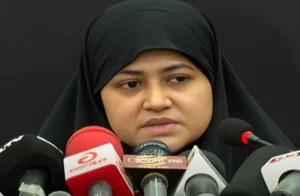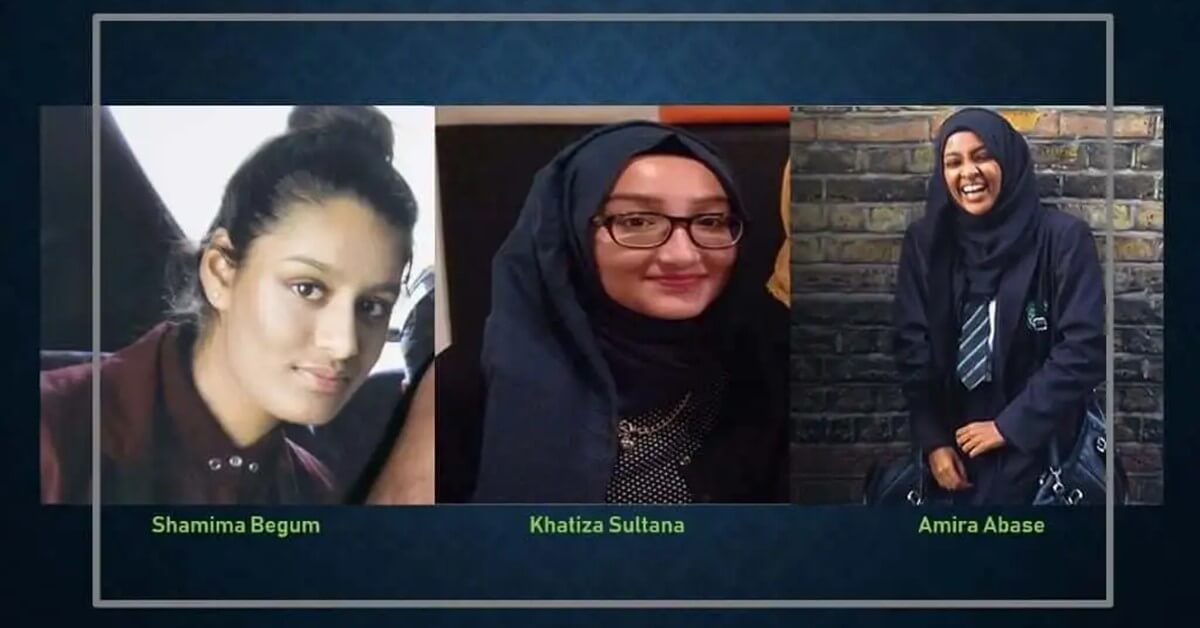Last updated on June 19th, 2024 at 10:33 am
The jihadi brides’ return to their homes, after the collapse of the ISIS Caliphate, has given birth to added security concerns across the globe, especially in the West and Europe. Among the brides who left their countries to join ISIS, a Bangladeshi-born girl, Shamima Begum is one of them.
Even though many managed to return to their respective countries, Shamima was not accepted by the British government for security reasons. She was one of the three girls to leave the UK for Syria in 2015. Shamima lost her last battle against the removal of her British citizenship in February 2024, The Guardian reports.
History of Shamima Begum: the jihadi bride of Bangladesh
In February 2015 three school friends, Shamima Begum, 15, Khadiza Sultana, 16 and Amira Abase, 15, all from Bethnal Green Academy School in East London boarded a Turkish Airlines flight to Istanbul from London Gatwick Airport and disappeared to join ISIS.
All forms of media start reporting every tiny bit of details of the trio only to perpetuate constant fear among civilians.
These three girls attended the same school, Bethnal Green Academy School in Tower Hamlets, where they appear to have been hardworking students with a grade of A. Apart from the trio, other schoolmates of Sharmeena Begum and an unknown girl are believed to have travelled to Syria for the same purpose in 2014.
Born to a Bangladeshi mother, Shamima Begum married a Dutch IS fighter Yago Reidijk, who later surrendered to Kurdish Forces, right after three weeks of her arrival in Syria. Going by the reports, she is just one of the 550 to 1,000 European women who travelled to Syria. Shockingly, 1 of the 7 jihadists to travel to Syria and Iraq is a woman.
After the collapse of the so-called ISIS Caliphate based in Syria and Iraq, Shamima Begum was deserted among other 39,000 refugees in the al-Hawl detention camp in northern Syria. She was seen on February 14, 2019, issuing an appeal to the British government to come back to the UK. Being heavily pregnant and due to giving birth, all she ‘wanted to come home to Britain.
She later on Monday, 18 February, gave birth to her second son and named him Jerah after her first son who died of malnutrition while she was living with her husband. Historians have interpreted that the name has a reference to a 7th-century Islamic warlord, Abu Obaidah Ibn al-Jerrah.
Even though she desired to live in the UK with her son peacefully, she wished her first son to be an ISIS fighter. She said life under IS did indeed ‘fulfil her aspiration’ and said that living life there is just like a normal one apart from frequent fear of “bombs and stuff”. She said that when she was in Syria she stayed at home, cooked, and took care of her husband, kids during the entire four years. That, “I never encouraged people to come to Syria”, she adds.
Now 19 years old, Shamima’s desire to return to the UK after the collapse of the Caliphate sparked an international row about whether the British government should allow her access to the country and try or revoke her citizenship.
The country is divided on the issue as people are debating over the country’s “moral duty” over potential security threats that her return poses as to that she was a victim of “grooming”. However, she lost her British citizenship in the same year, on the security ground.
In an interview given to SkyNews Shamima Begum said did not regret her decision to join IS and that the people “should have sympathy” for her and that living under IS made her “tougher, stronger”, for which later she regrets saying.
She shows her support of murdering the journalist whom she said were “security threats to caliphate” and the severed head in a bin “did not faze me”. She has also equated the deaths of 22 people in the Manchester Arena Ariana Grande concert bombing in 2017 IS terror bombing and other atrocities attack to the civilians being bombed in ISIS territory between the Asad regime and ISIS militants.
Resonating people’s will the home secretary, Sajid Javid, said “My message is clear- if you have supported the terrorist organisations abroad I will not hesitate to prevent your return,” and eventually her citizenship as a British citizen has been revoked by the government.
Meanwhile, the Netherlands authority too denied any assistance regarding her prospective citizenship in the country leaving her stateless. She was seeking citizenship in Holland, where her husband might be sent to for imprisonment.
Hopeless, when she tried to return to Bangladesh, the government made its position clear by saying that it has nothing to do with her statelessness’, leaving no chance for her to enter the country.
“The caliphate is over,” she told the Times. “There was so much oppression and corruption that I don’t think they deserved a victory. I know what everyone at home thinks of me. But I just want to come home to have my child. All I want to do is come home to Britain.”
Shamima Begum again lost her appeal to return to the UK government in the wake of 2021. In February 2021, five Supreme Court judges of the UK turned down her request to return to the UK to fight for retrieving her citizenship.
According to the UK government there, 900 people like her pose national security concerns who have travelled from the UK to an ISIS-controlled area in Syria and Iraq. They estimate around 20% of all, some 180 of them are killed and 40% returned. More than 100 of them are women who travelled to ISIS-controlled territory from the UK alone.
The British news portal The Telegraph published a few exclusive photographs of Shamima where she was seen in Western clothing on. The Telegraph described it as “she looks more suited to a shopping trip on Oxford Street than life in a camp for hardened jihadists”. She was seen in the Al-Roj concentration camps for IS supporters, among other women who also incurred a similar fate like hers.

The flow of both men and women to the ISIS-controlled territory is a concern for Western governments, that fear that these individuals could pose a grave threat on their return home.
The number of Western foreign fighters and migrants to ISIS is estimated to be up to 4,000, with over 550 to 1,000 women within this figure.
Why jihad: push and pull factors
This unprecedented figure of Western male foreign terrorist fighters is paralleled by an equally unprecedented number of women travelling to support ISIS. Women from Western countries are targeted by ISIS for various “Push” and “Pull” factors. The women are defined as Western if they indicate that they originate from Europe (excluding Russia and Turkey), the United States, Canada, Australia or New Zealand.
Due to Shariah Law’s prohibition of women being combatants, the women travelling to ISIS-controlled territory do not currently engage in combat, their support is rather based on domesticity and being virtuous wives and mothers to husbands and children. For this reason, they will be generally described as female migrants to ISIS-held territory or at other times by the Arabic term muhajirah (singular) or muhajirat (plural).
The women who travel to Syria and Iraq can be divided into two categories, (a) those that travel with male companions or husbands, and (b) those that make the trip alone. Of those that travel alone, three primary reasons behind leaving homes for joining ISIS have been identified: grievances, solutions and personal motivations.
The crucial “push” and “pull” factors that prime women and lead them down to a path of an ideological killing spree and violent radicalised fanaticism to the point at which they decide they must take the path of making hijra (migrate) and join ISIS, become self evidential.
International Strategic Dialogue (ISD) and the International Centre for the Study of Radicalisation (ICSR) research found that “these women, once in ISIS territory, are not being used in combat and are currently prohibited from combative activities by the strict interpretations of Shariah Law.
Moreover, they provide with a diverse range of factors of their travelling which expanded far beyond the common and conventional idea of “Fighter Brides”. These self-identified women who travel in ISIS-controlled territory often profess themselves as muhajirat or female migrants on their social media existence.
Before we delve into the “Push” and “Pull” factors for women to join the notorious killing cult, we must know that ISIS had tens of thousands to up to 200,000 militaries with more than 30,000 fighters of which, according to CIA report, more than 30,000 were foreign militants from 80 countries.
Tunisia and Saudi Arabia are top on the list with 3,000 and 2,500 fighters respectively while Pakistan saw 500 fighters joining ISIS. In just 2015, 2016, and 2017 apart from mass killings that took place inside the kingdom, which claimed 15,000 and as per a UN report, in 2018 it discovers 200 mass graves that may contain up to 12,000 bodies. Wikipedia mentions about 75 ISILS brides.
Moreover, it carried out numerous attacks on civilians killing more than 1,300 people outside Syria and Iraq. Nearly 5000-7000 Yazidi women were abducted, raped, forced-married and sold.
Irrespective of the “Push” and “Pull” factors that compel or attract women to join ISIS, let us get familiar with some celebrated female muhajirat or travellers who travelled from different parts of the West and Europe.
When the declaration of the so-called Caliphate was announced in 2014, ISIS developed a unique jihadist strategy that immediately recognised the importance of bringing women more actively into propaganda and recruitment efforts. Declaring a Caliphate meant that new energies had to be given to state-building efforts.
In its manifestoes, ISIS developed its female-centric efforts which are observed in its online-based magazine publication Dabiq where sections are primarily dedicated for women as to ‘Sister of Islamic State’ allowing them to have their voice heard through recruitment strategy.
The most compelling example of this was observed during the Jordanian hostage crisis in January 2015.
In exchange for the Jordanian pilot, Moaz al-Kasasbeh, ISIS demanded the release of an Iraqi prisoner held in Jordan, Sajida al-Rishawi. Sajida had been an al Qaeda would-be suicide bomber who was condemned to death for her participation in the deadly attack in Amman in 2005. Whereas her husband’s suicide bomb had been successful, hers had failed to detonate.
In broadcasting by Al-Bayan radio, transmitting to ISIS-controlled territory, the group called for the release of ‘our sister’. While there are a number of other key jihadist officials that ISIS could have asked for in exchange with al Kasasbeh, the request of a female jihadist sent a very strong message; ISIS supports and holds dear its female force.
The followings are some women who travelled from the Western and European world to the ISIS territory. These women were radicalised none but simply through the online contents and ISIS utopian propaganda.
Salma And Zahra Halane
Born in Charlton, Greater Manchester, in the UK the Halane twins,16, Salma Halane and Zahra Halane, confirmed their access to Syria on July 9, 2014. Their family reported their disappearance on June 26 and were believed to have flown to Istanbul from Manchester airport and journeyed aiming to cross the Turkey-Syria frontier at Akcakale.
With their high academic performance, the twins aspired to pursue medical science which they failed to do as joining their brother Ahmed Ibrahim Mohammad Halane took precedence over education strive for success.
Tara Nettleton, Zaynab Sharrouf

A convicted terrorist Khaled Sharrouf relocated his wife, a Muslim convert named Tara Nettleton, his daughter Zaynab, another daughter (believed to be 11 years old) and three young boys – to the Islamic stronghold of Raqqah from their home in South-West Sydney.

Khaled’s wife Tara and daughter Zaynab appear to occupy a highly significant role within the sub-cluster of Australian female migrants to ISIS territory, of which there are estimated to be around 20.
Zaynab had been living with her parents and younger siblings in Raqqah for just over a year when she was reportedly married, at 14, to a longstanding acquaintance of her father and a fellow fighter with ISIS named Mohammed Elomar who was a former boxing champion. He too came from Sydney.
Zehra Duman

A close friend of the Sharrouf women, Zehra Duman, is a 21-year-old woman of Turkish descent from Melbourne, Australia who announced her arrival in Syria in December 2014. Her complete dedication to the ideological notions of jihad, hijra and the obligatory nature of these concepts is most prominent when these women and girls are tackled on their decision to support a terrorist organization.
Zehra’s rapid embedding into this large Australian social network of fighters and wives may account for the fervent emphasis placed on her own identity as an Australian in her efforts to encourage others to make hijra to ‘the Caliphate’.
About hijara her urge to women is that if they do not do it they are adding fuel to the fire, meaning every woman has to attack from wherever they are. This may be understood as one of many interactions within which Duman makes a specific connection between herself as an Australian (or the West, more broadly) and home-grown, ‘lone wolf’ terrorist attacks. Her Twitter is used actively to encourage violent action against ‘the West’ as a community. Zehra makes specific calls for ISIS supporters living in Western countries to enact their own jihad by murdering civilians.
Shams: The Doctor
Shams is one of the most valued voices which has to emerge from the English-speaking female hijara legion.
Shams, as it she refers to herself, is originally from Malaysia with both an Indian and Pakistani lenience. But she is believed to have lived in the UK for a considerable period of time. By virtue of her professional stand, as a physician, she had a privileged position within ISIS since her appearance in Syria in 2014.
Upon hearing this information, the local ISIS Emir reportedly sent a female representative to offer Shams a house that could be used as a clinic, along with medical equipment. Nonetheless, she, as a qualified physician, she often used her position within ISIS territory to reiterate Baghdadi’s call for qualified people like doctors, engineers and lawyers to join, exemplified below.
She also offers advice on how women can gain medical training once inside the territory; discussing the medical ‘university’ that has reportedly been established in Raqqah. She stresses the importance of fully evaluating one’s reasons for wanting to migrate to ISIS before making a final decision. Specifically, she urges women to consider whether they are making hijra for marriage, or because they feel it is their religious obligation.
Shams states explicitly, “don’t make marrying a mujahid as your priority”, she adds that they should undertake this decision, “Not for fame, not for nikah [marriage] and not for fun”, but as a jihadist fighter.
Emili: The Airhostess

Though not related to the girls and women who made their journey to ISIS-controlled territories, to be isis brides or be at the service of the jihadi fighters, the story of Ambia Sultana Emili’s joining Jama’atul Ansar Fil Hinda Sharqiya, a local extremist group, compels us to see the pull factor from a different angle.
Well-educated, Emili was an air-hostess by profession and worked for a couple of years with United Airways in Bangladesh. She joined the outfit without her husband’s knowledge and sent her 15-year-old son Abu Bakar alias Raisad Rayan to “Hijrat” for the sake of faith.
After the police arrest, she confessed that she was radicalised by some Muslim youths.
Motivation Or Depression
The major push factors that International Strategic Dialogue (ISD) have tracked that motivate Western females to migrate to ISIS-controlled territory are often not dissimilar, if not the same, as their male counterparts. These include:
- Feeling isolated socially and/or culturally, including questioning one’s identity and uncertainty of belonging within Western culture.
- Feeling that the international Muslim community as a whole is being violently persecuted.
- Anger, sadness and/or frustration over a perceived lack of international action in response to this persecution. The primary pull factors we have identified by International Strategic Dialogue (ISD) are driving Western females to migrate to the so-called Caliphate have some major similarities with the reasons behind the male foreign terrorist fighter movement.
However, the narratives and propaganda defining these pull factors tend to differ greatly due to the drastic differences in roles men and women play once inside ISIS-controlled territory.
Idealistic goals of religious duty
In order to embrace a new worldview, inspired by ISIS, central to forming a utopian society these women who travel to join ISIS efforts are disowning the Western culture they have grown up and with it the foreign policy they have been introduced. Their hope and aspiration to contribute to ISIS’ perspective society, strictly ruled by parochial elucidation of Shariah law, the hope of the establishment of a so-called Caliphate is considered pivotal in attracting these women.
This promise and vision of the utopian society they dream about are crucial because, in such a social peace, prosperity, medieval form of just and fairness, male hegemony over female and along with the assurance of heaven afterlife a virtuous lifestyle are all any virtuous man can expect.
Within the radicalization process, these women, as much as men, have a strong belief in the afterlife and fulfilling this perceived religious duty is key in securing their place in heaven.
Belonging And Sisterhood
In addition to the heavenly rewards promised for the afterlife, women also discuss the rewards one gains within this life for making hijra to ISIS territory.
One of the largest pull factors for some women is the sense of belonging and sisterhood. Consider that, these men and women desperate for a Utopian society are basically the ones who do not feel and cannot feel like accepting the Western way of living whereby feel alienated from the mainstream society.
As discussed in the discussion of push factors, many Muslim women living within Western societies undergo a natural process of questioning their identities and belonging during their teens and early adulthood. The added factor of being a part of minority ethnicity and/or religion tends to naturally embed a sense of ‘otherness’, particularly for women wearing the hijab or niqab as a symbol of their faith. Their sense of belonging get rooted and recognised in the availing of companions who would not question their incompatibility.
Romanticism Of The Experience
Human beings are strange species. Opposites Attract sometimes play a vital role in romance and courtship. The final major pull-factor ISIS propaganda provides, attracting both male and female recruits from the West, plays heavily on romantic notions of adventure and finding romance in the form of a husband or wife.
The sense of adventure in leaving home to travel to new places is influential, particularly for younger women. It is worth remembering that a large number of Western women joining ISIS are as young as 13 years old. In the interview, Shamima Begum expressed, “I married my husband. I would not have had someone like him back in the UK”.
The other adventure is one based on the promise of meaningful romance as a prize for making the journey. Online, images of a lion and lioness are shared frequently to symbolize this union. This is symbolic of finding a brave and strong husband but also propagandises the notion that supporting a jihadist husband and taking on the ISIS ideology is an empowering role for females.
Ultimately, these women believe that joining ISIS in Syria will secure their place in paradise, give them the opportunity to take part in the construction of a utopian society, while also providing those sensations of adventure, belonging and sisterhood.
Some still tend to argue that those who travelled are exploited victims who are too naïve to bring a distinction between good and bad consequences. They are certainly anything but not vulnerable and exploited teens who simply chose their death over life, romance over aloneness, destruction over creation, fanaticism over secularism, ecstasy over boredom and religion over humanity.
These are other forms of instances their religious strict interpretation take precedence over human co-existence, tolerance, the rewards of the afterlife over the present act of humanity. On any count killing human beings, if not other beings too, is never acceptable to any sane mind. The more science, philosophy, culture and human ingenuity advance the more humanity and human empathy should take an advanced path as well.
Marginalised, oppressed and persecuted? Do marginalisation, oppression, and persecution justify waging war against innocents, killing civilians, fellow religionists and people of different religions? Or it is just retaliation out of jealousy over secular-minded, libertarian and peace-loving people?
If those women who fled for ISIS and prepared beds for them to sleep with, bear their children and assist their efforts in the killing, then in which rationale we cannot take refuge to the reasoning to hold them responsible for the equal crime? What choice did they leave for the civilised minds except to let them live by the choices and values they chose to go after? No sympathy, empathy, and compassion to shows towards those returnees who collaborated with the killing cult ISIS.
Conclusion
Women might be kind, caring, understanding, submissive and soft-headed, but the women who travelled to ISIS-controlled territory or stayed with them for an extended period of time develop a sense of desensitization.
Over time they witnessed the killing, bombing and religious exigencies backed by the political aspiration of these muhajuirah’s worldview changed. Backed by desensitised feeling never hesitate to kill someone with even gruesome intent which is even a greater reason for higher pleasure. They became a potential killing object as time passes.
A muhajirah, for instance, writes about drawing pleasure in watching the gory acts of killing, “‘I was happy to see the beheading of that kaafir [non-believer], I just re-winded to the cutting part. Allahu akbar! [God is the greatest!] I wonder what was he thinking b4 the cut”. She even was asking for more beheadings.
There is no doubt, therefore, that the women who migrate to the territory controlled by ISIS revel in the gore and brutality of the organisation. They appear desensitised to the horrific nature of the violent acts being committed.
They become desensitised to extreme violence aimed at their opponents. The female migrants in our sample have been significantly affected by the loss of their husbands, which has, in some cases, strengthened their commitment to ISIS. These women are capable of carrying out any potential devastation and big influences on the vulnerable groups of the people who sustain the same ideological views.
They can never have a camaraderie with people of the different sects of Islam, let alone other religions. Historically and psychologically proven that religion always takes a strong root in women’s hearts either it is because of their physiology or ignorance. As usual, they are the greater recruiters, influences, convincers, seducers, provocations, strength and greater ways to be ensnared.
On February 25, 2019, following the termination of citizenship of both her and her daughter Shamima Begum reluctantly said sorry for her “mistake” and begged for a “second chance”, but her stance about her husband remains the same as ever saying she still loves him and will wait for him.
As of February 2024, the British Government has not reconsidered its decision of stripping her of British citizenship.
Sources:
- Lone-Actor Terrorism database workshop by Royal United Services Institute for Defence and Security Studies.
- Becoming Mulan Female Wester Migrants to ISIS by Institute for Strategic Dialogue.
- ‘Till Martyrdom Do Us Part’ Gender and the ISIS Phenomenon.
